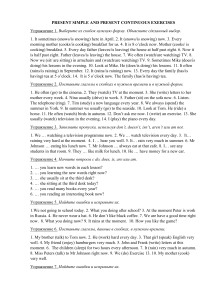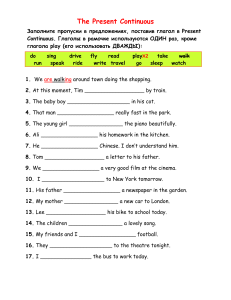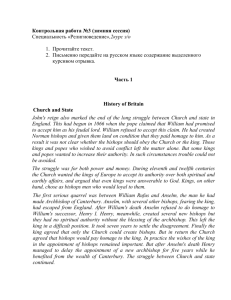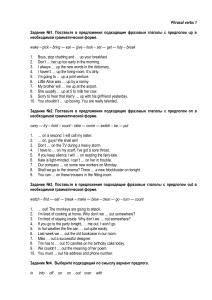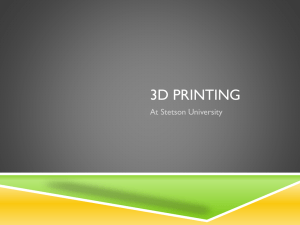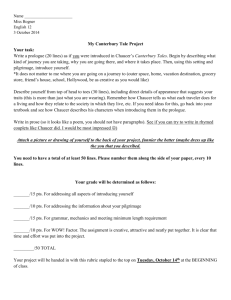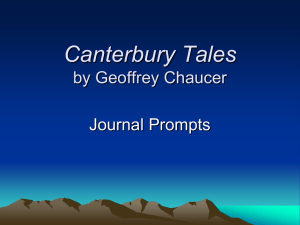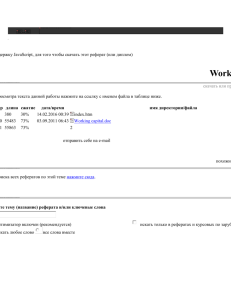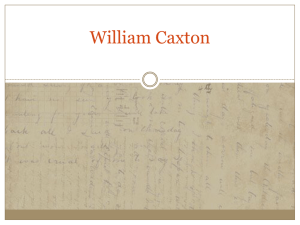4. Поставьте глаголы в скобках в Present Perfect.
advertisement
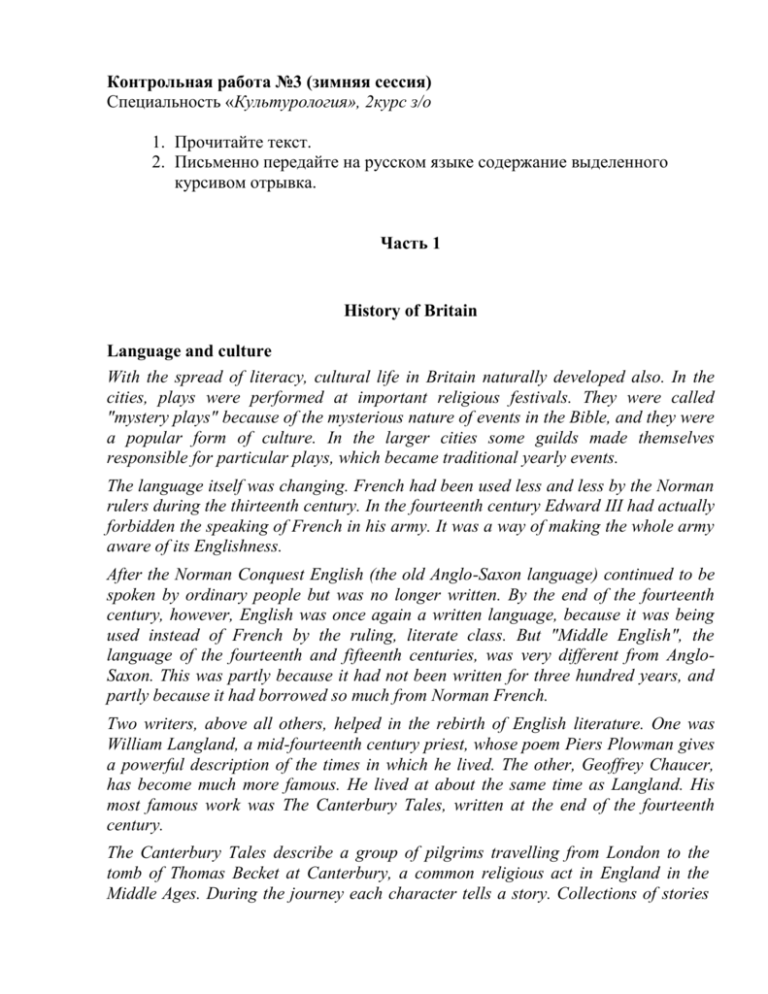
Контрольная работа №3 (зимняя сессия) Специальность «Культурология», 2курс з/о 1. Прочитайте текст. 2. Письменно передайте на русском языке содержание выделенного курсивом отрывка. Часть 1 History of Britain Language and culture With the spread of literacy, cultural life in Britain naturally developed also. In the cities, plays were performed at important religious festivals. They were called "mystery plays" because of the mysterious nature of events in the Bible, and they were a popular form of culture. In the larger cities some guilds made themselves responsible for particular plays, which became traditional yearly events. The language itself was changing. French had been used less and less by the Norman rulers during the thirteenth century. In the fourteenth century Edward III had actually forbidden the speaking of French in his army. It was a way of making the whole army aware of its Englishness. After the Norman Conquest English (the old Anglo-Saxon language) continued to be spoken by ordinary people but was no longer written. By the end of the fourteenth century, however, English was once again a written language, because it was being used instead of French by the ruling, literate class. But "Middle English", the language of the fourteenth and fifteenth centuries, was very different from AngloSaxon. This was partly because it had not been written for three hundred years, and partly because it had borrowed so much from Norman French. Two writers, above all others, helped in the rebirth of English literature. One was William Langland, a mid-fourteenth century priest, whose poem Piers Plowman gives a powerful description of the times in which he lived. The other, Geoffrey Chaucer, has become much more famous. He lived at about the same time as Langland. His most famous work was The Canterbury Tales, written at the end of the fourteenth century. The Canterbury Tales describe a group of pilgrims travelling from London to the tomb of Thomas Becket at Canterbury, a common religious act in England in the Middle Ages. During the journey each character tells a story. Collections of stories were popular at this time because almost all literature, unlike today, was written to be read out aloud. The stories themselves are not Chaucer`s own. He used old stories, but rewrote them in an interesting and amusing way. The first chapter, in which he describes his characters, is the result of Chaucer's own deep understanding of human nature. It remains astonishingly fresh even after hundred years. It is a unique description of a nation: young and old, knight and peasant, priest and merchant, good and bad, townsman and countryman. By the end of the Middle Ages, English as well as Latin was being used in legal writing, and also in elementary schools. Education developed enormously during the fifteenth century, and many schools were founded by powerful men. One of these was William of Wykeham, Bishop of Winchester and Lord Chancellor of England, who founded both Winchester School, in 1382, and New College, Oxford. Like Henry VI's later foundations at Eton and Cambridge they have remained famous for their high quality. Many other schools were also opened at this time, because there was a growing need for educated people who could administer the government, the Church, the law and trade. Clerks started grammar schools where students could learn the skills of reading and writing. These schools offered their pupils a future in the Church or the civil service, or at the universities of Oxford and Cambridge. The universities themselves continued to grow as colleges and halls where the students could both live and be taught were built. The college system remains the basis of organization in these two universities. The Middle Ages ended with a major technical development: William Caxton's first English printing press, set up in 1476. Caxton had learnt the skill of printing in Germany. At first he printed popular books, such as Chaucer's Canterbury Tales and Malory's Morte d`Arthur. This prose work described the adventures of the legendary King Arthur, including Arthur's last battle, his death, d the death of other knights of the Round Table. almost certainly Malory had in mind the destruction of the English nobility in the Wars of the Roses, which were taking place as he wrote. Caxton's printing press was as dramatic for his age radio, television and the technological revolution are for our own. Books suddenly became cheaper and more plentiful, as the quicker printing press replaced slow and expensive copywriting by hand. Printing began to standardize spelling and grammar, though this process was a long one. More important, just as radio brought information and ideas to the illiterate people of the twentieth century, Caxton's press provided books for the newly educated people of the fifteenth century, and encouraged literacy. Caxton avoided printing any dangerous literature. But the children and grandchildren of these literate people were to use printing as a powerful weapon to change the world in which they lived. Часть 2. 1. Поставьте глаголы в нужную форму, пассивный залог. 1) TV ___ by Baird (invent). 2) Pyramids ___ by Egyptians (build). 3) His hat ___ away by the wind now (blow away). 4) Coffee ___ in Brazil (grow). 5) Chopsticks ___ in China (use). 6) The plants ___ by water at the moment (water). 7) The thief ___ yesterday (chase). 8) The robber ___ last week (arrest). 9) The injured man ___ to hospital now (take). 10) The car ___ tomorrow (repair). 11) The vase ___ just ___ (break). 12) The dishes ___ yet (not / wash). 13) The long dresses ___ in 1890 (wear). 14) Dinner ___ in ten minutes (serve). 15) The letters ___ at the moment (type). 16) Guernica ___ by Picasso (paint). 17) The parcel ___ yet (not / deliver). 18) Alpha Romeo cars ___ in Italy (make). 19) The thief ___ late last night (arrest). 20) The letter ___ next week (deliver). используя 2. Переведите глаголы в предложениях из активного залога в пассивный. 1) The gardener has planted some trees. 2) Doctor Brown will give you some advice. 3) A famous designer will redecorate the hotel. 4) Steven Spielberg directed “E.T.”. 5) Someone has broken the crystal vase. 6) His parents have brought him up to be polite. 7) Fleming discovered penicillin. 8) They will advertise the product on television. 9) Someone is remaking that film. 10) The police arrested him. 11) The traffic warden had already given him a ticket for illegal parking 12) People must obey the law. 13) Someone had broken our door down. 14) They chose him as the best actor of the year. 15) Somebody has stolen a bus from outside the school. 3. Переведите глаголы в предложениях из активного залога в пассивный. 1) He gave me a present. 2) The waiter will bring us the bill. 3) The Queen presented him with a medal. 4) Her mother bought Mary some sweets. 5) Bob has sold Ted a second-hand car. 6) Larry is going to send a letter to Tom. 7) Someone is helping her with the housework. 8) A pickpocket robbed me. 9) The mail-order company sent Mrs Green a parcel. 10)Someone will pay you within the next few days. 11)You can improve your health with more exercise. 12)A dog is chasing the child. 13)My friend sent me an invitation. 14)The farmer is building a new barn. 15)The secretary has given Mrs Jones some letters. 1. 2. 3. 4. 5. 6. 7. 8. 4. Поставьте глаголы в скобках в Present Perfect. The train to Moscow ___ (already/leave). Michael ___ to my home town twice (be). I ___ my leg once (break). We ___ here for a year (live). I ___ the film twice (watch). My sister ___ the book (read). We ___ to London (never/be). Mary ___ her friend (just/see). 9. My friends ___ in the Atlantic Ocean (never/swim). 10. I think I ___ her before (not see). 11. She ___ a holiday this year (not have). 12. The shop ___ yet (not open). 13. John ___ a bicycle (never/ride). 14. We ___ our homework yet (not do). 15. I ___ to the cinema for ages (not be). 16. Our letter ___ (yet/arrive). 17. My parents ___ in the same city all their lives (live). 18. The Smiths ___ a house (move). 5. Поставьте глаголы в скобках в Present Perfect. 1. What organisations ___ he ___ for (work)? 2. How many flowers ___ we ___ (sell)? 3. ___ you ___ an arm (ever/ break)? 4. ___ the post ___ (arrive)? 5. ___ Ms Smith ___ here longer than you (work)? 6. ___ your daughter ___ in a tent (ever/sleep)? 7. Where ___ you ___ (be)? 8. How long ___ they ___ their house (have)? 9. How many books ___ Michael ___ (write)? 10. What cities ___ you ___ to (be)? 6. Заполните пропуски в предложениях используя for или since. 1. I haven't been at home ___ Christmas. 2. We've been here ___ ten o'clock. 3. I have worked for this company ___ more than eight years. 4. I haven't been to the theatre ___ ages. 5. I have studied for the exam ___ 9.15. 6. I have had this toy ___ I was eight. 7. She hasn't had a day off ___ 2007. 8. John has been in France ___ more than three weeks now. 7. Раскройте скобки, поставив глаголы в скобках в Present Perfect или Past Simple. 1. I ___ 10 km (run / just) . 2. I ___ 20 km last week (run) . 3. I ___ a composition two days ago (write). 4. I ___ two compositions this month (write / already) . 5. I ___ my friend (ring / just) . 6. I ___ my friend 10 minutes ago (ring) . 7. Two days ago, I ___ a Madonna concert on TV (watch) . 8. I ___ Madonna live in concert (see / already) . 9. I ___ my summer holiday in Sochi last year (spend). 10. I ___ to Sochi yet (be / not). 8. Ознакомьтесь с ситуациями и составьте предложения из слов в скобках, используя Past Perfect: 1) You went to Jill’s house, but she wasn’t there. (she/go/out) She had gone out. 2) You went back to your home town after many years. It was not the same as before. (it/change/a lot). 3) I invited Rachel to the party but she couldn’t come. (she/arrange/to do something else) 4) You went to the cinema last night. You arrived to the cinema late. (the film/already/begin) 5) I was very pleased to see Tim again after such a long time. (I/not/see/him for five years) 6) I offered Sue something to eat but she wasn’t hungry. (she/just/have/breakfast) 1) 2) 3) 4) 5) 9. Поставьте глаголы в скобках в Past Perfect или Past Simple: John ____ the candles when she arrived (light). She ____ lunch before the children came home (cook). When she arrived at the theatre he ____ the tickets (buy). After Jim and Terry had finished their breakfast, they ____ to fish (go). The party ____ by the time I arrived (already/start). 6) She sealed the letter, put a stamp on it and _____ it (post). 10. Поставьте глаголы в скобках в Future Perfect: 1) She ____ by 8 o’clock (finish). 2) I ____ this book by next week (read). 3) They ____ a new school by the end of this year (build). 4) He ____ from University by 2009 (graduate). 5) She ____ doing her homework when her mother comes home (finish).
